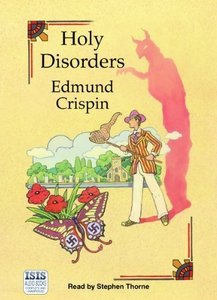I am happy to announce the return of the “No Plot Spoiler Book Reviews.” My goal is to review three books by the same author each week that I am able to spare the time for it. In general, I will not give away any more details than one can find in the first chapter, or on the back cover blurb. There will though be general comments about the author’s writing style, and the nature of the work itself. The following entry about “Holy Disorders,” by Edmund Crispin, published in 1945 will serve as an excellent example.
“Holy Disorders,” by Edmund Crispin, published in 1945, is the second book in the Professor Fen series of detective novels. While “Holy Disorders” is the second in the series of 9 novels and several short stories; it is the first novel that I read. I am rather glad about this fact as I think had I read “The Case of the Gilded Fly” first; I might not have carried on with the series. But I wouldn’t let that put you off. Almost every novelist’s first book is disappointing in some way or another.
While 1945 came to a close, it was obvious that Britain and the Allies would win the European Theater conflict of World War II; it was not obvious in previous years, particularly not during the Battle of Britain, which is the timeframe of the novel, set in a northern cathedral town.
One of the main characteristics of the Professor Fen novels is that Fen figures who the murder, or murders are fairly quickly, but is always frustrated in his search for proof of his conclusions. In this novel, which is a delightfully well-constructed locked room mystery, Fen’s conclusion about the murder’s identity rests primarily on a chance comment made by the murder, the sort of detail that had the person not been the murder, they never should have known. I’ll simply say that I caught one of these details, and missed several others. Fen also is the original prototype of the bumbling Inspector Clouseau sort of character, although he certainly is nothing of the sort. This point is obvious to the reader as well as Fen’s friends, but not always obvious to other characters in the novel.
So if you are the sort of person that likes pitting your own logic against the well crafted nearly impossible to solve mystery, than “Holy Disorders,” by Edmund Crispin is certainly the book for you.
(As a general note, I will always put the Amazon.com blurbs last, as I’ve often found over the years that they rather spoil aspects of the plot of books. So if you’re hypersensitive to that sort of thing, than don’t read any further.)
Amazon.com writes this potential plot spoiler:
Eccentric Oxford professor Gervase Fen remains as maddeningly childish as ever, still deliciously fond of his own wit and erudition. He’s equally fond of amateur sleuthing, so the murder of the cathedral organist is a cause for glee. Could the fellow have fallen afoul of a nest of German spies or of the local coven of witches, ominously rumoured to have been practicing since the 17th century? Tracking down the answer pleases Fen immensely only the reader will have a better time.














